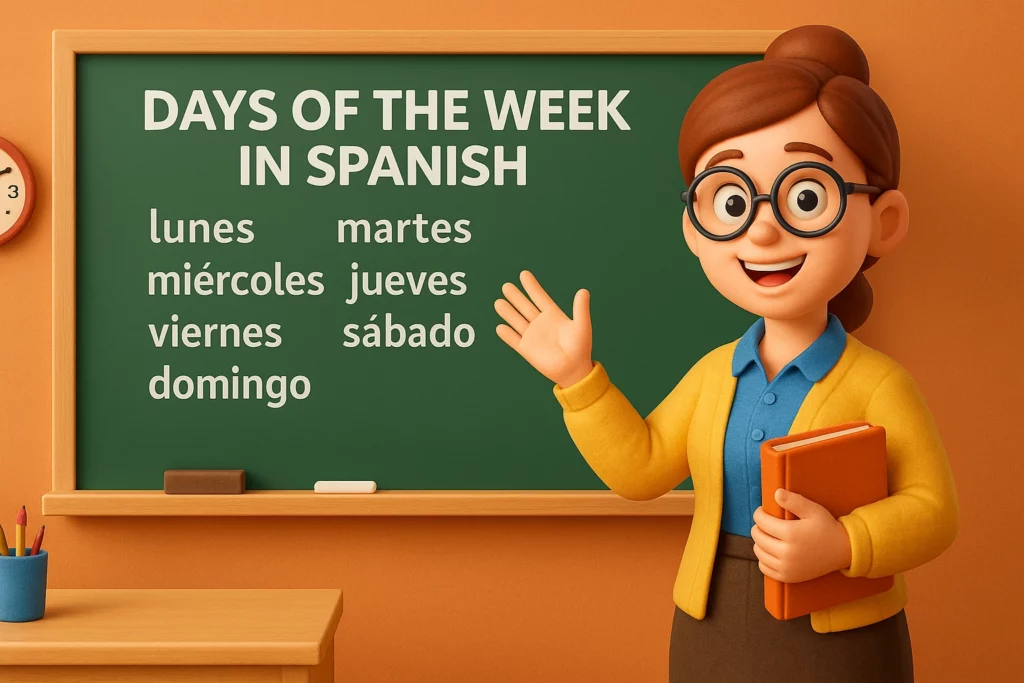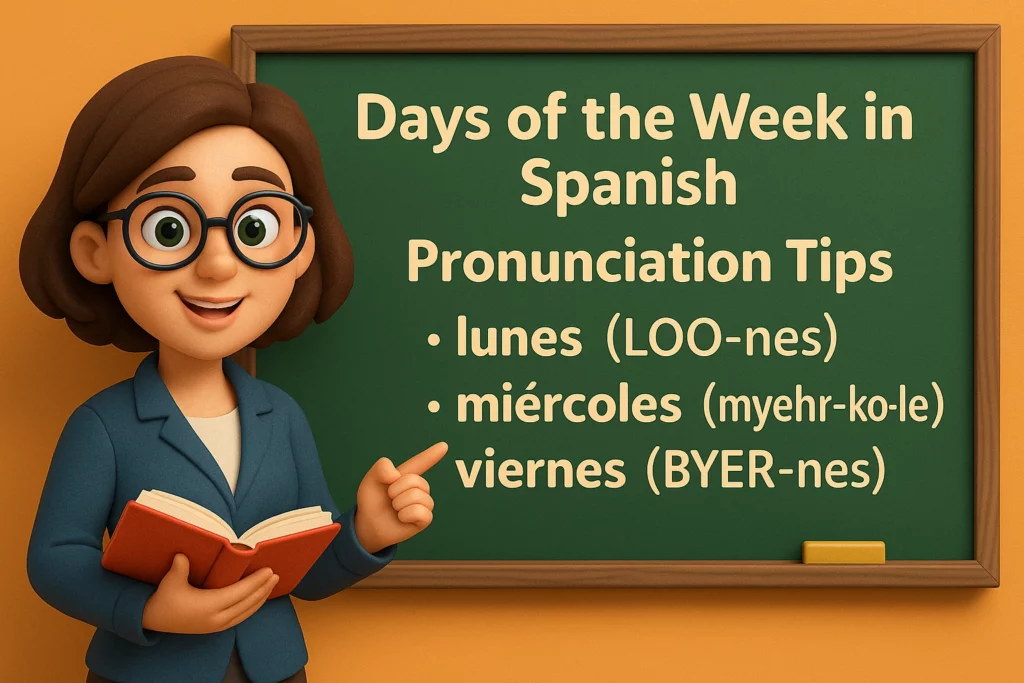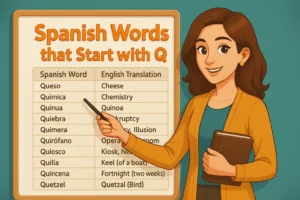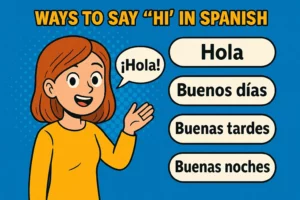
¡Hola estudiantes! (Hello, students!) I’m so excited you’re here today because we’re going to learn something fun and very important: the days of the week in Spanish! Whether you’re a kid starting to explore a new language, or an adult looking to brush up your skills, knowing the days of the week in Spanish is a great first step to mastering the language.
Have you ever wondered, “what are the days of the week in Spanish?” or “how do you say the days of the week in Spanish clearly and confidently?” Don’t worry—today I’ll teach you everything step-by-step, just like a real Spanish teacher would in class.
Learning the 7 days of the week in Spanish is not only easy but also enjoyable. We’ll practice pronunciation, remember each day easily, and I’ll even show you how they compare clearly in both Spanish and English.
And here’s a little secret: knowing the days of the week in Spanish in order helps you talk naturally about your plans, appointments, or even favorite TV shows! You might even be curious to compare what you’ve learned with translations from days of the week in Spanish Google Translate—but don’t worry, I’ll clearly teach you even better ways to remember and pronounce each day.
Here’s a quick example to get you started:
- Spanish: “Hoy es lunes.”
- English: (“Today is Monday.”)
Doesn’t that sound simple? By the end of this guide, you’ll confidently know how to clearly say “all days of the week in Spanish,” and you’ll feel proud of yourself for learning something new!
Ready to begin our fun lesson together? ¡Claro que sí! (Of course!)
Days of the Week in Spanish and English (Easy Comparison Table)
¡Excelente trabajo, estudiantes! (Great job, students!) Now let’s clearly learn the 7 days of the week in Spanish along with their English translations. Understanding and memorizing the days of the week in Spanish becomes much easier when you clearly see them side-by-side.
Here’s an easy and helpful table clearly showing all days of the week in Spanish and their English meanings:
| Spanish Days | English Days | Pronunciation Tips |
| Lunes | Monday | LOO-nes |
| Martes | Tuesday | MAR-tes |
| Miércoles | Wednesday | mee-AIR-co-les |
| Jueves | Thursday | HWEH-ves |
| Viernes | Friday | vee-AIR-nes |
| Sábado | Saturday | SAH-bah-doh |
| Domingo | Sunday | doh-MEEN-goh |
Why Does the Week Start with Lunes (Monday)
Did you notice something interesting? In many Spanish-speaking countries, the week clearly begins with lunes (Monday), not Sunday like in some English-speaking countries! This helps clearly keep the “days of the week in Spanish in order,” especially for school schedules and work calendars.
Helpful Practice Sentences:
Let’s practice these Spanish days clearly in everyday sentences:
- Spanish: “Tengo clase de español el martes.”
English: (“I have Spanish class on Tuesday.”) - Spanish: “Vamos al cine el viernes.”
English: (“We’re going to the movies on Friday.”)
Quick Activity for Practice:
Try saying clearly “the days of the week in Spanish” out loud three times. Start slowly, then gradually speed up. Practice makes perfect!
- Lunes, Martes, Miércoles, Jueves, Viernes, Sábado, Domingo!
Clearly understanding and memorizing these days will help you easily plan activities, schedule appointments, and enjoy your week confidently—just like native Spanish speakers!
Next, we’ll learn clearly “how do you say the days of the week in Spanish” with some fun tips and tricks to help you remember them even better!
How Do You Say the Days of the Week in Spanish? (Easy Pronunciation & Memory Tips!)

¡Muy bien, estudiantes! (Very good, students!) You’ve learned all days of the week in Spanish clearly listed side-by-side with their English translations. Now, let’s dive deeper into clearly understanding how to say the days of the week in Spanish correctly and easily.
Pronunciation is key to sounding natural, so we’ll practice the pronunciation clearly, and I’ll also share some fun and easy tricks to help you remember each day!
Suggestion: Say I Love You In French Like A Native With These 18 Phrases.
Easy Pronunciation Guide (with Fun Examples)
- Lunes (LOO-nes) – Think of the “moon” to remember “Monday” (Moon-day).
- Martes (MAR-tes) – Sounds like “Mars.” Imagine visiting Mars on Tuesday!
- Miércoles (mee-AIR-co-les) – Sounds tricky? Just break it clearly: “Mee-AIR-co-les” (middle of the week = Wednesday).
- Jueves (HWEH-ves) – Rhymes slightly with “waves”. Imagine surfing on Thursday!
- Viernes (vee-AIR-nes) – Think of “Very nice” —Friday always feels nice, doesn’t it?
- Sábado (SAH-bah-doh) – Sounds like “Sabbath,” a restful day.
- Domingo (doh-MEEN-goh) – Think “Dominoes pizza on a relaxing Sunday!”
Simple Memory Tips (Mnemonics)
Here’s a simple sentence clearly helping you remember “days of the week in Spanish in order“:
“Little Mice Make Jumpy Voices So Delightful.”
- Little = Lunes
- Mice = Martes
- Make = Miércoles
- Jumpy = Jueves
- Voices = Viernes
- So = Sábado
- Delightful = Domingo
Clearly repeating this fun mnemonic will easily fix the “7 days of the week in Spanish” in your memory!
You May Also Like: Learn 7 Natural Ways To Say See You Tomorrow In French.
Listen and Repeat Activity
Let’s practice speaking clearly! Repeat after me:
- “Lunes, Martes, Miércoles, Jueves, Viernes, Sábado, Domingo!“
Practice this three times clearly, louder each time. Great job!
Next, we’ll learn clearly how you can naturally use the days of the week in Spanish in practical everyday sentences, helping you speak confidently with Spanish-speaking friends and family.
Using the Days of the Week in Spanish: Practical Everyday Examples
¡Excelente trabajo hasta ahora, estudiantes! (Excellent work so far, students!) You’ve clearly learned how to say the days of the week in Spanish. Now, let’s put your new knowledge into action. I’ll show you practical sentences clearly demonstrating how to use “all days of the week in Spanish” naturally in daily conversations.
Related: Explore 100+ Easy French Compliments For Any Situation
Everyday Conversations Clearly Using Days of the Week:
Example 1 – School Schedule:
- Spanish: “Tengo matemáticas el lunes, miércoles y viernes.”
- English: (“I have math on Monday, Wednesday, and Friday.”)
Example 2 – Making Plans:
- Spanish: “¿Quieres ir al cine el sábado?” — “Sí, claro.”
- English: (“Do you want to go to the movies on Saturday?” — “Yes, of course.”)
Example 3 – Talking About the Weekend:
- Spanish: “Descanso el domingo.”
- English: (“I rest on Sunday.”)
Example 4 – Setting an Appointment:
- Spanish: “La cita con el doctor es el jueves.”
- English: (“The doctor’s appointment is on Thursday.”)
Example 5 – Discussing Weekly Routine:
- Spanish: “Practico deportes el martes y jueves.”
- English: (“I practice sports on Tuesday and Thursday.”)
Quick Practice Activity for You
Now, let’s clearly practice speaking. Answer these questions aloud:
- Spanish: “¿Qué día es hoy?” (What day is it today?)
Your answer: “Hoy es miércoles.” (Today is Wednesday.) (replace “miércoles” with today’s actual day!) - Spanish: “¿Cuál es tu día favorito?” (What’s your favorite day?)
Your answer: “Mi día favorito es viernes.” (My favorite day is Friday.)
Clearly practicing these simple conversations regularly helps you naturally integrate the “days of the week in Spanish and English” into your daily vocabulary.
FAQs: Common Questions about Days of the Week in Spanish
1. What are the days of the week in Spanish?
Here are clearly “all days of the week in Spanish”: Lunes, Martes, Miércoles, Jueves, Viernes, Sábado, Domingo.
2. Why does the week start on Monday in Spanish?
Great question! In Spanish-speaking countries, the week typically begins with lunes (Monday) instead of Sunday. It’s clearly a cultural difference rooted in historical traditions from European calendars.
3. How do you say “weekend” clearly in Spanish?
“Weekend” in Spanish is “fin de semana.”
Example: “Me encanta el fin de semana.”
(“I love the weekend.”)
4. Do Spanish days of the week need capitalization?
No, in Spanish, clearly remember the “days of the week in Spanish and English” differ in capitalization rules. Spanish days are always lowercase unless at the start of a sentence.
- Incorrect: “Hoy es Lunes.” ❌
- Correct: “Hoy es lunes.” (Today is Monday.)
5. How do you clearly ask “What day is today?” in Spanish?
- Clearly ask this way: “¿Qué día es hoy?” (What day is today?)
- And clearly respond with: “Hoy es miércoles.” (Today is Wednesday.)
6. How do you remember the “7 days of the week in Spanish”?
Clearly practice using fun mnemonic phrases or catchy rhythms. Remember our earlier example?
- “Little Mice Make Jumpy Voices So Delightful.”
7. Is “Google Translate” accurate for “days of the week in Spanish”?
Generally yes, “days of the week in Spanish Google Translate” will give you accurate translations. However, it’s always best clearly learning proper pronunciation and usage from trusted educational resources like this blog.
Useful Resources & Tips to Master Days of the Week in Spanish
¡Felicitaciones, estudiantes! (Congratulations, students!) You’ve made it to our final section—fantástico trabajo (fantastic job)! Now, let me clearly provide you with some excellent resources and practical tips to keep practicing and mastering the “days of the week in Spanish.”
Trusted Online Resources:
- SpanishDict – Offers clear translations, pronunciation audio, and practical examples of using “all days of the week in Spanish.”
- WordReference – A reliable source for confirming translations and getting community-supported explanations.
- Duolingo – Interactive and engaging lessons, perfect for clearly reinforcing vocabulary like “the days of the week in Spanish.”
Educational Videos & YouTube Channels:
- Butterfly Spanish – Engaging, clear video lessons ideal for mastering pronunciation and practical usage of “days of the week in Spanish and English.”
- Easy Spanish – Real-world conversations clearly demonstrating everyday use of Spanish vocabulary, including days of the week.
Quick Tips to Clearly Remember the Days:
- Daily Practice: Clearly say the “days of the week in Spanish in order” every morning to naturally memorize them.
- Calendar Challenge: Change your phone or wall calendar clearly to Spanish. This immersion technique quickly familiarizes you with “7 days of the week in Spanish.”
- Song & Rhymes: Practice with catchy songs available on YouTube—just search “days of the week in Spanish song,” which can clearly help both kids and adults memorize easily.
Example Sentences for Daily Review:
- “Mi cumpleaños es el sábado.” (“My birthday is on Saturday.”)
- “Practico fútbol el martes y jueves.” (“I practice soccer on Tuesday and Thursday.”)
- “No tengo escuela el domingo.” (“I don’t have school on Sunday.”)
Clearly practicing with these resources and tips regularly will enhance your fluency, making you confident and comfortable using “days of the week in Spanish” in your daily life.



